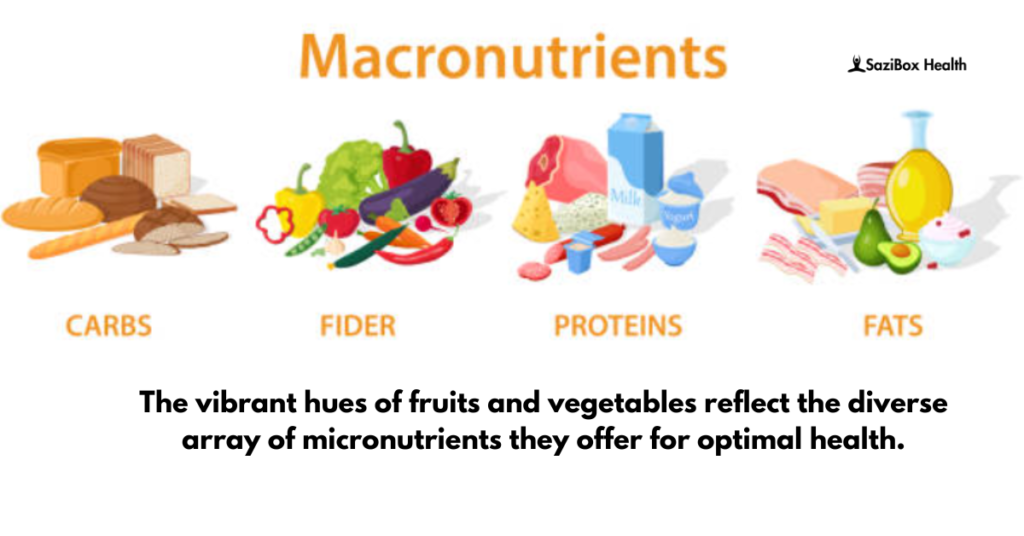
Welcome back to our series, “Nourishing Your Whole Self: The SaziBox Health Guide to Holistic Nutrition”! In our second article, we explored the holistic approach to food and its connection to overall well-being. Now, let’s get down to the nitty-gritty of nutrition itself: macronutrients and micronutrients.
These are the essential building blocks that your body needs to thrive. Understanding their roles will empower you to make informed food choices and fuel your body for optimal health.
Macronutrients: Your Body’s Fuel

Macronutrients are the big players in your diet – you need them in large amounts to provide energy and support bodily functions. Think of them as the fuel that keeps your engine running smoothly.
- Carbohydrates: Energy Powerhouses
- Carbohydrates are your body’s primary source of energy. They’re broken down into glucose, which fuels your cells and brain.
- Sources: Whole grains (brown rice, quinoa, oats), fruits, vegetables, legumes (beans, lentils).
- Types: Simple carbohydrates (sugars) and complex carbohydrates (starches and fibre).
- Why they matter: Complex carbohydrates provide sustained energy and are rich in fibre, essential for digestive health and blood sugar control.
- Tip: Choose whole grains over refined grains for more fibre and nutrients.
- Proteins: Building and Repairing
- Proteins are the building blocks of your body, essential for muscle growth, tissue repair, enzyme production, and hormone regulation.
- Sources: Meats, fish, poultry, eggs, dairy products, beans, lentils, nuts, seeds, and tofu.
- Amino Acids: Proteins are made up of smaller units called amino acids, some of which your body cannot produce (essential amino acids).
- Why they matter: Proteins support growth, development, immune function, and satiety (feeling full).
- Tip: Include a variety of protein sources to get all the essential amino acids.
- Fats: Essential for Health
- Despite their bad reputation, fats are crucial for energy storage, hormone production, vitamin absorption, and protecting organs.
- Sources: Avocados, nuts, seeds, olive oil, fatty fish (salmon, mackerel), and dairy products.
- Types: Unsaturated fats (healthy) and saturated fats (consumed in moderation).
- Why they matter: Fats are vital for brain health, hormone balance, and even glowing skin and hair.
- Tip: Focus on unsaturated fats and limit saturated and trans fats.
Interactive Quiz:
Test your knowledge with our quick Macronutrient Quiz!
Micronutrients: Your Body’s Spark Plugs

Micronutrients are vitamins and minerals your body needs in smaller amounts. They may not provide energy, but they’re like the spark plugs that ignite vital bodily processes.
- Vitamins: Organic compounds essential for various functions, like vision, immunity, and blood clotting.
- Examples: Vitamin C (immunity), Vitamin D (bone health), and B Vitamins (energy metabolism).
- Why they matter: Vitamins are crucial for overall health and disease prevention.
- Tip: Eat a rainbow of fruits and vegetables to get a wide array of vitamins.
- Minerals: Inorganic elements are vital for bone health, nerve function, and fluid balance.
- Examples: Calcium (bones), Iron (oxygen transport), Magnesium (muscle function).
- Why they matter: Minerals play a critical role in hundreds of bodily functions.
- Tip: Choose whole grains, leafy greens, dairy, and lean meats for a variety of minerals.
- Essential Fatty Acids: Omega-3s and omega-6s are essential fats that your body can’t produce.
- Sources: Fatty fish, flaxseeds, chia seeds, walnuts, and algae oil.
- Why they matter: These fats support brain health, heart health, and reduce inflammation.
- Tip: Aim to include fatty fish in your diet twice a week or consider a supplement.
- Fibre: A type of carbohydrate your body can’t digest, crucial for gut health and digestion.
- Sources: Fruits, vegetables, whole grains, legumes.
- Why it matters: Fiber promotes regular bowel movements, aids in blood sugar control, and lowers cholesterol.
- Tip: Aim for 25-35 grams of fiber per day.
Read more
Interactive Infographic:
- Explore the “Micronutrient Rainbow“!
Your Unique Nutritional Needs
Remember, everyone is different. Your optimal balance of macronutrients and micronutrients will depend on various factors, including your age, activity level, and health conditions. Consulting a registered dietitian can help you create a personalized plan that aligns with your individual needs and goals.
Stay tuned for the next article in our series, where we’ll delve deeper into the fascinating world of gut health and its connection to your overall well-being.
Disclaimer: The information provided in this article is for educational purposes only and is not intended as a substitute for professional medical advice. Always consult with a qualified healthcare provider before making any significant changes to your diet.





[…] Macronutrients & Micronutrients: Your Essential Nutrition Guide […]
[…] Macronutrients & Micronutrients: Your Essential Nutrition Guide […]